Top 10 Interior Designers in Singapore Redefining Hospitality Interiors with Innovative Design Solutions
Hospitality interior design is the art of creating spaces that are both functional and aesthetically pleasing, tailored specifically for the needs of the hospitality industry. It involves designing hotels, restaurants, and other guest-centric spaces to enhance comfort, efficiency, and the overall guest experience. In Singapore, a hub for global tourism and business, well-designed hospitality spaces are vital for staying competitive. Thoughtful design not only influences guest satisfaction but also impacts a hotel’s reputation and repeat business.
Interior design plays a critical role in hospitality success, particularly in terms of creating memorable guest experiences. In Singapore’s thriving hospitality industry, where total room revenues reached $4.8 billion in 2023, the impact of a well-designed space is clear. With tourists increasingly expecting unique and memorable stays, hotels that invest in high-quality design are better positioned to attract and retain guests, especially in the competitive tourism and hospitality market.
Transform your hospitality business with the right interior designer. Take a look at Becozon’s directory of top interior design firms in Singapore and see how they can help you create functional, beautiful commercial spaces that truly stand out.
The Impact of Professional Hospitality Interior Design on Business Efficiency and Guest Satisfaction
In the world of hospitality, design goes far beyond aesthetics—it defines the guest experience and supports the daily operations of a business. Hospitality interior design involves planning, creating, and overseeing spaces that are functional, efficient, and visually appealing. This helps in the development of hotels and resorts where every element, from the sleek lobby to the smartly designed guest rooms, serves a purpose, seamlessly blending comfort and practicality.
For businesses in Singapore’s competitive hospitality industry, investing in professional interior design is crucial. With their expertise, designers can transform ordinary spaces into environments that not only meet the needs of guests but also enhance operational efficiency. A well-designed space does more than just attract attention—it improves workflow, maximizes space utilization, and aligns with the brand’s identity. For hotels, restaurants, and other hospitality venues, partnering with professional designers is a strategic investment that can elevate both guest satisfaction and business success.
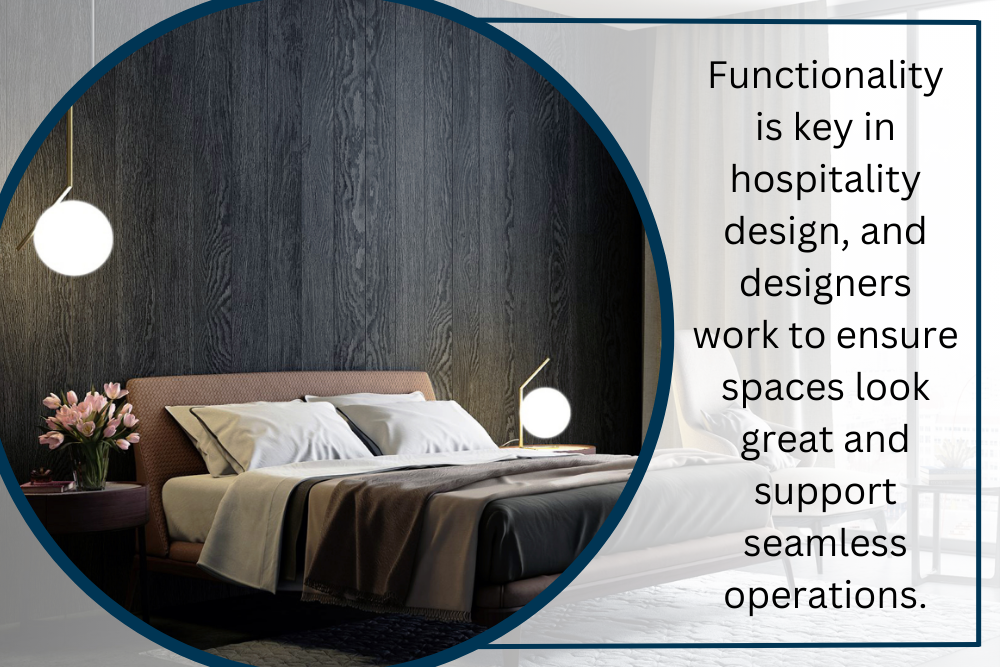
The Key Elements of Hospitality Interior Design
Hospitality interior design goes beyond aesthetics; it embraces the latest hotel design trends to create commercial spaces that are functional, comfortable, and memorable. By blending style with purpose, design professionals craft environments that cater to both the needs of guests and the operational requirements of the business. Here are the key elements that define successful guest-centric layout design.
Aesthetic Balance
Aesthetic balance is crucial in hospitality interior design, where the goal is to blend style and functionality seamlessly. Incorporating modern luxury design elements alongside current interior design trends creates spaces that are both visually appealing and practical. A custom interior design with thoughtfully selected colours, textures, and materials promotes the brand’s identity while providing guests with a comfortable and sophisticated environment, enhancing the overall guest experience.
Functionality
Functionality is a cornerstone of effective hotel and resort design, ensuring that spaces not only look good but also work efficiently. Incorporating the latest hotel design trends, designers create practical design solutions that focus on the efficient use of space. From optimizing guest flow to creating flexible areas, functionality enhances both the guest experience and operational effectiveness, making the most of every inch without sacrificing comfort or aesthetics.
Comfort
Comfort is essential in creating memorable guest experiences, especially in guestroom design. Thoughtfully chosen furniture, soothing colour schemes, and proper climate control contribute to a relaxing and enjoyable stay. A well-designed guestroom should reflect the hotel’s commitment to comfort, reinforcing its hotel branding and identity. By prioritizing comfort in every detail, from bedding to lighting, hotels can ensure that guests feel at home, leading to higher satisfaction, repeat visits, and positive reviews.
Lighting
Lighting is essential for creating the right atmosphere and enhancing guest experiences in hospitality spaces. In contemporary design, lighting serves both functional and aesthetic purposes, reflecting the latest hotel design trends. From warm, ambient lighting in lobbies to bright, task-oriented lighting in workspaces, each choice is crucial. Effective lighting highlights architectural features, enhances design aesthetics, and sets the tone throughout the hotel.
Use of Space
Effective use of space is key to creating functional spaces in hospitality design. Smart space planning ensures that areas are both practical and aesthetically pleasing. Designers maximize every inch, ensuring that public spaces, guest rooms, and service areas are well-organized and easy to navigate. For example, in smaller hotels, efficient space use allows for amenities like lounges or cafes without overcrowding, enhancing guest comfort and operational flow.
Acoustics
Acoustics are a critical yet often overlooked aspect of hospitality interior design. Proper sound management ensures that spaces remain peaceful and comfortable, whether in a bustling hotel lobby or a quiet guestroom. Designers use materials like sound-absorbing panels, carpets, and soft furnishings to minimize noise. Thoughtful acoustic design enhances privacy and relaxation, contributing to an overall positive guest experience.
Sustainability
Sustainability is a growing priority in hospitality interior design, aligning with modern interior design trends. By incorporating sustainable design practices, such as using eco-friendly materials, energy-efficient systems, and water-saving technologies, hotels can reduce their environmental impact. This approach not only meets guest expectations but also lowers long-term operational costs while promoting responsible business practices.
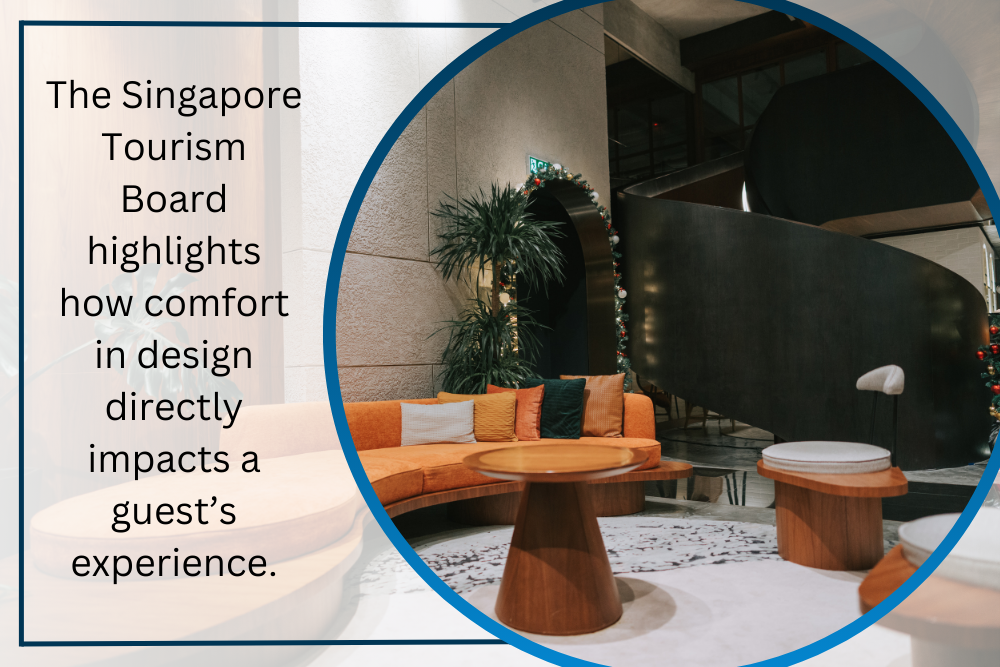
The Impact of Interior Design on Guest Satisfaction and Retention
Interior design plays a pivotal role in shaping guests’ perceptions and overall experience. Well-designed spaces can evoke positive emotions, making guests feel comfortable and valued. This emotional connection often translates into repeat visits and strong brand loyalty. Here are the key ways interior design influences guest satisfaction and retention.
First Impressions Matter
First impressions are crucial in hospitality design, as they shape guests’ overall perceptions. A well-designed lobby or reception area creates a welcoming atmosphere, reflecting the brand’s identity. Key design elements like lighting, furniture, and decor immediately communicate quality and professionalism, establishing a positive connection that encourages repeat visits and recommendations.
First impressions are crucial in hospitality, as they set the tone for the entire guest experience. Incorporating modern luxury design elements that reflect the latest interior design trends creates a welcoming and memorable atmosphere. Meticulously designed lobbies and reception areas, with well-chosen lighting fixtures and furniture, can leave lasting impressions that enhance guest satisfaction and loyalty.
Enhancing Comfort
Comfort plays a crucial role in guest satisfaction, particularly in guestroom design. Thoughtful custom interior design can create a relaxing atmosphere that meets both aesthetic and functional needs. The Singapore Tourism Board emphasizes the importance of comfort, as it directly impacts the guest experience, encouraging repeat visits and enhancing a hotel’s overall reputation in the competitive market.
Reflecting Brand Identity
Interior design is a powerful tool for conveying a hotel’s unique visual identity. By integrating the brand’s values and personality into the space, design aesthetics help create a memorable guest experience. Key elements include:
- Colour schemes: Consistent use of brand colours throughout public and private areas strengthens brand recognition.
- Furniture and decor: Custom pieces that reflect the hotel’s character enhance its distinctiveness.
- Signage and artwork: Incorporating branded visuals reinforces the connection between the design and the hotel’s visual identity.
Improving Functionality
Functionality is crucial for ensuring smooth guest experiences, while thoughtful layout planning reflects the design expertise required to make spaces both practical and inviting. For example, efficient room layouts and well-placed amenities reduce guest frustrations and enhance convenience, while optimizing staff workflows, leading to higher guest satisfaction and retention.
Stimulating Positive Emotions
Interior design has the power to evoke emotions that directly influence guest satisfaction. Elements like warm colours, natural materials, and soft lighting create a welcoming and calming atmosphere, making guests feel relaxed and valued. These positive emotional responses enhance their overall experience, increasing the likelihood of repeat visits and recommendations.
Personalization
Personalization in interior design creates a unique and memorable experience for guests. Tailored design elements, such as customized room layouts or decor that reflects local culture, make guests feel special and valued. This attention to detail fosters a sense of connection, improving guest satisfaction and encouraging repeat visits.
Supporting Operational Efficiency
Interior design directly enhances operational efficiency by improving staff workflows and guest experiences. According to the EHL Hospitality Business School, investing in functional layouts makes daily operations smoother. This includes optimizing storage areas and strategically placing service stations. Efficient design choices, like easy-to-clean surfaces, can also reduce housekeeping time.
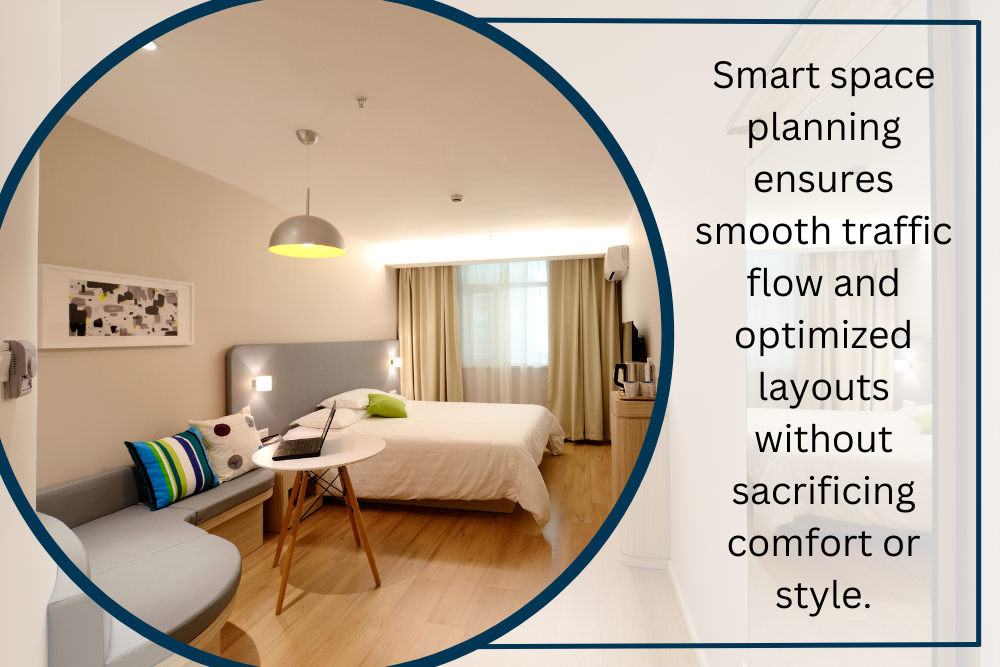
Functional Design: Maximizing Efficiency and Comfort
In guest-centric space planning, functionality and aesthetics are equally important. A well-designed space must not only look visually appealing but also enhance both guest comfort and operational efficiency. Achieving the right balance between beauty and function ensures that commercial spaces are both practical for staff and inviting for guests, contributing to a positive overall experience.
Here are key aspects of functional design that create optimal hospitality environments.
Smart Space Planning
Smart layout is essential for maximizing both efficiency and guest comfort in hospitality spaces. Effective space planning ensures smooth traffic flow, minimizes congestion, and optimizes the use of available areas. Through thoughtful interior design, hotels can create versatile spaces that cater to guests’ needs while maintaining functionality. This balance enhances the guest experience and supports the hotel’s operational goals.
Ergonomic Furniture
For hospitality establishments, ergonomics in design is critical to ensuring guest comfort and well-being. Ergonomic furniture combines functionality and aesthetics, designed to be visually pleasing while supporting the body’s natural posture to provide maximum comfort.
For example, well-designed chairs with proper back support in lounges or dining areas enhance relaxation while promoting good posture. Ergonomics in design not only improves guest satisfaction but also reflects the business’s attention to detail in creating functional spaces. Comfortable, supportive furniture contributes to a positive guest experience and encourages longer stays.
Multi-Functional Spaces
In functional hotel design, creating multi-functional spaces is essential for maximizing both efficiency and guest comfort. These spaces are designed to serve various purposes without sacrificing style or functionality. For example, a lobby may double as a lounge or co-working area, while a dining space can transform into an event venue. This flexibility allows hotels to adapt to different guest needs and activities, optimizing the use of limited space while ensuring that every area remains practical, comfortable, and aesthetically pleasing.
Accessibility
Accessibility is a critical aspect of functional hotel design, ensuring that all guests, regardless of mobility, can enjoy a comfortable and convenient stay. This includes designing wider hallways, ramps, and accessible bathrooms, as well as providing elevators with easy-to-reach controls. Accessible guest rooms should feature lower light switches, grab bars in bathrooms, and barrier-free showers. Thoughtful design ensures compliance with regulations while enhancing the experience for guests with disabilities, ultimately making the hotel more inclusive and welcoming to all.
Efficient Workflows
Efficient workflows are essential to ensuring smooth hotel operations. Thoughtful functional hotel design can streamline staff movements, from housekeeping to food service. For instance, strategically placed service areas, well-organized kitchens, and easily accessible storage reduce unnecessary steps and improve productivity. Efficient workflows not only minimize service delays but also improve overall guest satisfaction by ensuring that staff can quickly attend to their needs.
Climate Control
Climate control is crucial in hospitality interior design to ensure guests remain comfortable in any weather. Effective systems include air conditioning, heating, and ventilation designed to maintain optimal temperatures throughout different seasons. Modern solutions, such as smart thermostats, allow for customizable settings in guest rooms, enabling guests to control their comfort. Additionally, energy-efficient systems reduce operational costs while ensuring air quality and proper humidity levels.
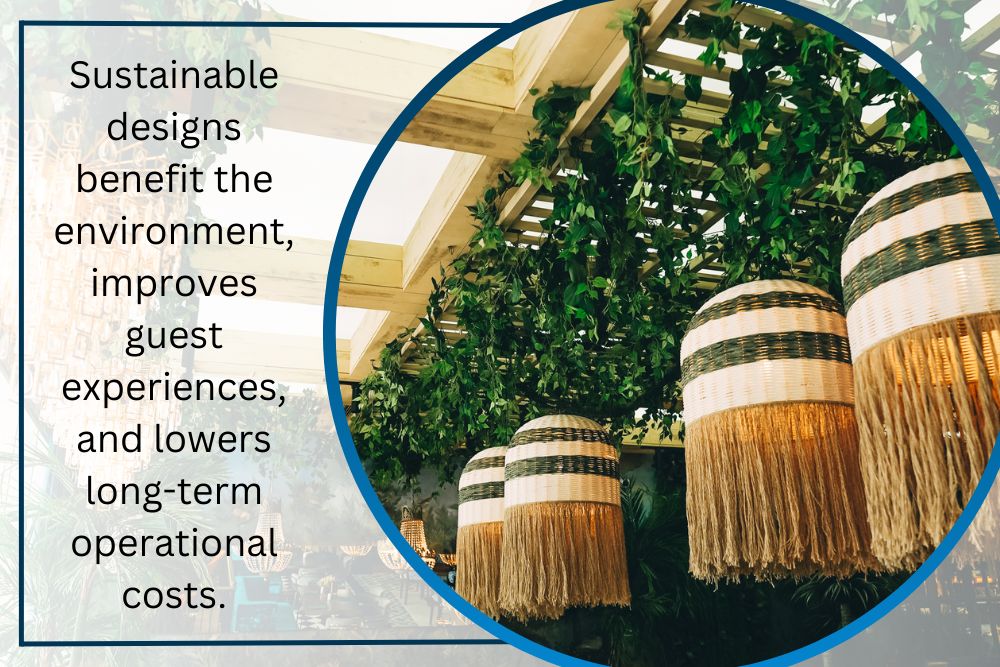
Sustainability and Interior Design: Building for the Future
Design sustainability is now a key focus in hospitality interior design, driven by the demand for eco-friendly solutions. Integrating sustainable practices benefits the environment, enhances guest experiences, and reduces long-term operational costs, making it a smart investment for businesses. Here are six key aspects of sustainable interior design.
Eco-Friendly Materials
Using eco-conscious design principles, eco-friendly materials like reclaimed wood, recycled fabrics, and low-VOC paints are increasingly popular in hospitality interiors. These materials reduce environmental impact while maintaining aesthetic appeal. Sustainable choices contribute to healthier indoor air quality and support long-term ecological balance. Incorporating durable, renewable resources not only aligns with sustainable design practices but also resonates with eco-conscious guests, enhancing a hotel’s brand reputation for environmental responsibility.
Energy-Efficient Lighting
Incorporating energy-efficient lighting is a vital component of eco-friendly design in hospitality spaces. Utilizing LED lights, smart sensors, and automated systems can significantly reduce energy consumption while maintaining a pleasant atmosphere. These sustainable practices help hotels meet the operational efficiency standards set by Singapore’s Hotels Act. By reducing electricity use, energy-efficient lighting not only cuts costs but also aligns with growing environmental responsibilities.
Water Conservation
Water conservation is a crucial element of sustainable hospitality design. Incorporating low-flow fixtures, such as faucets, showers, and toilets, significantly reduces water consumption without compromising guest comfort. Greywater recycling systems can also be integrated to reuse water for non-potable purposes like irrigation. These water-saving technologies help hotels lower operational costs and align with eco-friendly practices, while meeting the growing expectations of environmentally conscious guests.
Biophilic Design
Biophilic design integrates natural elements into indoor spaces, creating a stronger connection between guests and nature. This approach enhances well-being and supports sustainability efforts in hospitality design. Key aspects of biophilic design include:
- Natural Light: Maximizing natural light reduces the need for artificial lighting, improving energy efficiency and creating a more inviting atmosphere.
- Indoor Plants: Adding greenery enhances air quality and creates a calming environment, contributing to guest comfort and relaxation.
- Natural Materials: Using materials like wood, stone, and bamboo aligns with sustainable practices while adding warmth and texture to the space.
Biophilic design not only enhances the guestroom design but also reinforces a hotel’s commitment to eco-friendly design.
Renewable Energy
Integrating renewable energy into hospitality design not only reduces environmental impact but also offers significant cost savings. In Singapore, the installation of solar panels for commercial properties, including hotels, ranges from S$15,000 to S$38,000, with a 10 kWp system costing about S$20,000 on average. According to Fenice Energy, hotels can cut electricity bills by up to 90% by utilizing solar energy, depending on the system’s capacity and energy usage.
Long-Lasting Furnishings
Choosing durable, high-quality furnishings is essential in both sustainable and contemporary design. Long-lasting materials reduce the need for frequent replacements, minimizing waste and lowering long-term costs. In hospitality, this ensures that furniture maintains its appearance and functionality over time, even with heavy use. Incorporating timeless styles into contemporary design enhances both durability and aesthetic appeal, contributing to the hotel’s overall sustainability efforts while maintaining a stylish look.
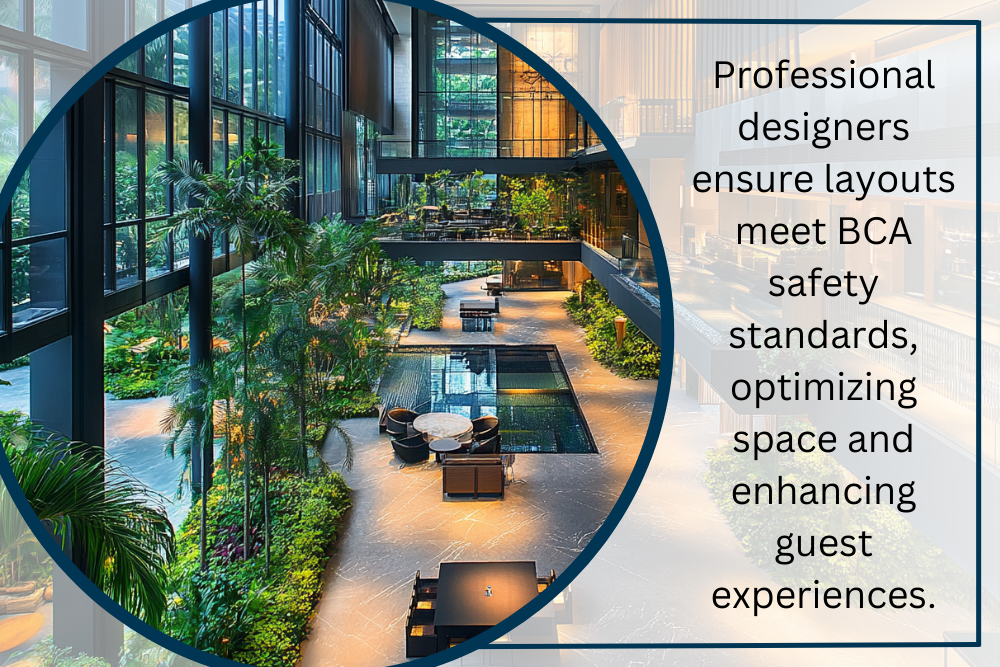
Partnering with Professional Interior Designers: Ensuring Success
Collaborating with a professional interior designer, especially one accredited by the Singapore Interior Design Accreditation Council (SIDAC), can greatly enhance the quality of your hospitality space. These designers bring expertise, creativity, and practical solutions, ensuring that your business achieves both functional efficiency and aesthetic appeal while adhering to industry standards.
Expertise in Planning and Design
Professional interior design goes beyond design aesthetics; it involves careful planning to ensure both functionality and compliance with local regulations. Design professionals are experts in the efficient use of space that meet the specific needs of hospitality businesses while adhering to industry standards.
These professionals apply their design expertise to ensure that their work complies with safety and accessibility guidelines set by the Building and Construction Authority (BCA). This is essential for creating layouts that optimize space, enhance guest experience, and improve operational efficiency. Professional interior design further incorporates elements like lighting, furniture placement, and materials to align with a brand’s identity while meeting functional goals, ensuring a well-balanced and successful hospitality space.
Execution and Project Management
Professional interior designers not only focus on creating beautiful spaces but also manage the entire project from concept to completion. A reliable design consultancy handles everything from sourcing materials to coordinating contractors, ensuring the project stays on schedule and within budget. By overseeing every detail, they reduce the likelihood of costly errors and delays, helping businesses save up in project costs through effective management.
For example, in a hotel renovation, the design team coordinates with contractors, suppliers, and other stakeholders, ensuring smooth communication and timely execution. They also manage unforeseen issues, like supply delays or construction challenges, and adjust plans accordingly without compromising the design vision. With expert project management, hospitality businesses can focus on daily operations while the design consultancy ensures a successful and hassle-free project execution.
Tailored Solutions for Singapore’s Hospitality Sector
Singapore’s hospitality industry presents unique challenges, such as space constraints and high guest expectations, which require customized interior design solutions. Professional interior designers understand these local nuances and can create tailored environments that cater to both business needs and guest experiences.
For instance, in a small boutique hotel, maximizing limited space is crucial. Design professionals can implement multi-functional furniture and efficient layouts that offer guests comfort without overcrowding the space. In a restaurant, designers might focus on ergonomics and traffic flow, ensuring that staff can move efficiently while maintaining a pleasant dining atmosphere.
Moreover, sustainable design elements like energy-efficient lighting and eco-friendly materials can appeal to eco-conscious travellers, a growing demographic in Singapore. By working with professional designers, hospitality businesses can meet these specific demands, ensuring a space that not only looks appealing but also functions seamlessly for guests and staff alike.
Make your hospitality business stand out with the help of experienced interior designers. From innovative design solutions to maximizing space efficiency, the right designer can elevate your guest experience. Discover Singapore’s best interior designers on Becozon, where you’ll find professionals known for their vision, technical skills, and dedication to excellence. Let them bring your vision to life.
Latest Becozon Offer
Boost your business with these exclusive deals by our esteemed Becozon partners
Looking for a CRM software?
Get customisable, cloud-based sales and operations CRM software suitable for any industry. Contact us for a demo today!
Contact Us




